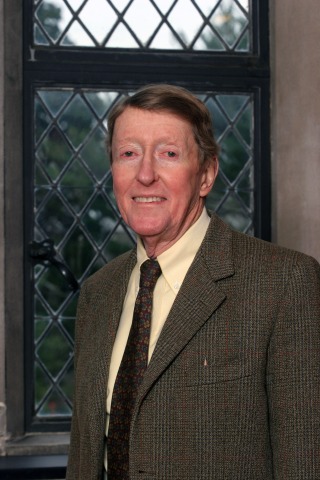In Memoriam: Russell T. “Darby” Scott
Russell T. “Darby” Scott, Doreen C. Spitzer Professor of Latin and Classical Studies
Russell T. “Darby” Scott, the Doreen C. Spitzer Professor of Latin and Classical Studies, passed away on May 28, 2024. For over 50 years Professor Scott served as a cherished faculty member who shared his wealth of knowledge with countless Bryn Mawr students, faculty, and staff.
Scott was born in Idaho in 1938. He received a bachelor's degree in Classics and Philosophy from Stanford University in 1960 and went on to receive his master’s and Ph.D. in Classics at Yale University. After graduating he was awarded a Fulbright Fellowship to Italy. He then won the renowned American Academy in Rome’s Rome Prize in Classics. While at the American Academy in Rome, he studied under renowned Roman archaeologist Frank E. Brown with whom he excavated at the Latin colony of Cosa in Etruria.
Scott came to Bryn Mawr College in 1962 when he was appointed assistant professor in Latin. He was promoted to associate professor in 1972 and professor in 1978.
Professor Scott’s scholarship focused on Roman archaeology and history of the republican and imperial periods with special reference to Italy and the western provinces. His field experience included excavations in the Roman Forum and at Cosa. He published numerous articles on these topics and maintained a deep connection to the American Academy in Rome throughout his career. He served as the Academy’s director of the Classical Summer School from 1974 to 1976, as a resident in 1979, as the Andrew W. Mellon Professor-in-Charge from 1984 to 1988, and as the co-director of the summer program in archeology throughout the 1990s.
President Emeritus Mary Patterson McPherson described his career, writing “Darby spent a very long and very distinguished career at Bryn Mawr. His experience in Rome was essential to the College as it first developed the program at the Villa Massensia. Darby was devoted to the College and its programs in the classics and archaeology and was enjoyed by many of his colleagues across fields.”
In addition to maintaining his own scholarship, Professor Scott was deeply committed to the learning of his students. He taught countless classes on Roman history and historiography and Roman archaeology to both graduate and undergraduate students. He also supervised 18 doctoral dissertations, 18 master’s theses, and numerous senior essays. His weekly Walk and Talks through Rome attracted experienced scholars and laypeople alike who all appreciated his insight and ability to uncover the history woven through the city.
Professor Scott was committed to the larger work of the College serving on the Committee on Libraries, the Committee on Undergraduate Scholarships, the Graduate Council, and the Committee to Revise the Plan of Governance. Throughout his service to the College, he maintained a kind, calm, and deliberate approach that was welcomed by his colleagues.
While Professor Scott’s many academic achievements are worthy of recognition, the remembrances of his friends, colleagues, and students rarely focus on his scholarship alone. Instead, colleagues remember the diligent way he approached his work and the kindness he showed those around him.
Radcliffe Edmonds, Paul Shorey Professor of Greek and Professor of Greek, Latin, and Classical Studies, described Professor Scott, writing, “Darby Scott moved in mysterious ways his wonders to perform. He never made a fuss about all the things he did; he just did them—excavations, publications, supervisions, department administrations—all without fanfare, quietly, efficiently, and effectively. His dry sense of humor was the same, delivered in a quiet deadpan that many people failed to catch because they weren’t expecting it. Darby will be missed by his colleagues and students at the College, as well as by a host of scholars in Rome and throughout the world whose lives he touched in his wonderful, mysterious ways.”
Professor Scott’s many contributions to Bryn Mawr College and to the field of Classics more broadly have left a wonderful legacy and will continue to influence those in his field and at the College for years to come.
Published on: 10/14/2024

